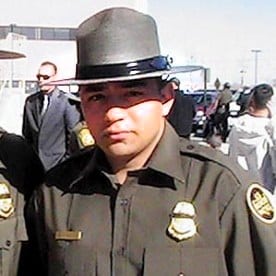
By Steve Elliott of Toke of the Town
Maybe Frank Zappa was right to ask, “Who are the Brain Police?” Remarks from a Border Patrol agent expressing dissatisfaction with the Drug War — made on the job to a fellow agent, a few feet from the Mexican border — later resulted in the agent’s firing after his remarks were passed along to headquarters.
Bryan Gonzalez, a young agent stationed in Deming, New Mexico, was in his Border Patrol vehicle next to the border when he pulled up to a fellow agent to chat about the frustrations of the job, reports Marc Lacey at The New York Times.
If marijuana were legalized, Gonzalez told the other agent, the drug-related violence across the border in Mexico would cease. He then mentioned an organization called Law Enforcement Against Prohibition (LEAP), consisting of former cops, judges and prosecutors who favor ending the War On Drugs.
“Now that The New York Times has featured LEAP and the emerging debate in the law enforcement community about ending the ‘war on drugs,’ hopefully this will lead to more sympathetic cops getting in touch with us and joining the movement,” LEAP’s media relations director, Tom Angell, told Toke of the Town on Monday morning.
“I’m already hearing from a lot of news outlets that don’t normally cover LEAP that the Times story caught their attention,” Angell said.
Those remarks — along with a few others expressing sympathy for illegal immigrants from Mexico — were reported to Border Patrol headquarters in Washington, D.C. After an investigation letter, Gonzalez was fired. A termination letter said that he held “personal views that were contrary to core characteristics of Border Patrol Agents, which are patriotism, dedication and esprit de corps.”
Gonzalez became one of a growing number of law enforcement officials who have lost their jobs for questioning the War On Drugs — and some of them are now fighting back in the courts.
Joe Miller, a probation officer in Mohave County, Arizona, filed suit last month in Federal District Court after he was fired for adding his name to a letter by LEAPexpressing support for the decriminalization of marijuana.
“More and more members of the law enforcement community are speaking out against failed drug policies, and they don’t give up their right to share their insight and engage in this important debate simply because they receive government paychecks,” said Daniel Pochoda, legal director for the American Civil Liberties Union (ACLU) of Arizona, which is handling the Miller case.
Miller was one of 32 LEAP members who signed the letter expressing support for Prop 19, a California ballot measure that failed last year, but would have allowed recreational marijuana use. Most of the 32 signers were retired, and thus could fearlessly speak their minds about legalization. But Miller and a few others — including the district attorney for Humboldt County and the Oakland city attorney — were still on the job.
LEAP, founded in 2002 by five disillusioned officers, now has an email list of 48,000, and includes 145 judges, prosecutors, police officers, prison guards and other law enforcement officials, most of them retired.
?”No one wants to be fired and have to fight for their job in court,” said Neill Franklin, a retired Baltimore narcotics cop who is LEAP’s executive director. “So most officers are reluctant to sign on board. But we do have some brave souls.”
Miller was accused of not making clear that he was speaking personally and not for the probation department when he advocated the legalization of marijuana. But his lawsuit points out that the letter he signed said at the bottom, “All agency affiliations are listed for identification purposes only.”
 He was also accused of lying about giving approval for his name to appear on the LEAP letter. In the lawsuit, Miller said that his wife had given approval without his knowledge, using his email address, but that he had later supported her.
He was also accused of lying about giving approval for his name to appear on the LEAP letter. In the lawsuit, Miller said that his wife had given approval without his knowledge, using his email address, but that he had later supported her.
Kip Anderson, court administrator for the Superior Court in Mohave County, claimed there was no intention of limiting Miller’s political views.
“This isn’t about legalization,” Anderson claimed. “We’re not taking a stand on that. We just didn’t want people to think he was speaking on behalf of the probation department.” Of course, nobody thought that, anyway.
Miller, a retired police officer and Marine, lost an appeal of his dismissal, but when his unemployment benefits were turned down, he appealed that and won. An administrative law judge ruled that Miller had not been dishonest with his bosses and that the disclaimer on the letter was sufficient.
Gonzalez, the fired Border Patrol agent, hadn’t even joined LEAP, but merely expressed sympathy with the group’s cause.
“It didn’t make sensed to me why marijuana is illegal,” Gonzalez said. “To see that thousands of people are dying, some of whom I know, makes you want to look for a change.”
Since his firing, Gonzalez — who filed suit in federal court in Texas in January — has worked as a construction worker, a bouncer and a yard worker. He has also gone back to school, and is considering getting a law degree.
“I don’t want to work at a place that says I can’t think,” Gonzalez said.
The Department of Justice has tried to have Gonzalez’s case thrown out. He lost a discrimination complaint filed with the Equal Employment Opportunity Commission; the EEOC sided with his employers’ view that they had lost trust he would uphold the law.
Those challenging the dismissals are given hope by the case of Jonathan Winder, who got fired as a police sergeant in Mountlake Terrace, Washington, in 2005, partly for supporting marijuana decriminalization.
Wender won a $815,000 settlement as well as his old job back. But he retired from the department (which couldn’t have been a very fun work environment for him after he’d handed them their legal asses) and started teaching at the University of Washington, where one of his courses is “Drugs and Society.”
 One Texas police officer who quietly supports LEAP said he’s not ready to publicly urge the legalization of drugs. “We all know the drug war is a bad joke,” he said. “But we also know that you’ll never get promoted if you’re seen as soft on drugs.”
One Texas police officer who quietly supports LEAP said he’s not ready to publicly urge the legalization of drugs. “We all know the drug war is a bad joke,” he said. “But we also know that you’ll never get promoted if you’re seen as soft on drugs.”
Meanwhile, LEAP’s executive director said it’s only natural that those on the front lines of the Drug War should have strong opinions about it. It was the death of one of Neill Franklin’s colleagues at the hands of a drug dealer in 2000 that prompted the veteran officer to begin questioning American drug policies.
“The disappointing fact is that many active duty law enforcers fear losing their jobs if they speak out, despite their belief that drug prohibition is a failure,” Franklin said. “LEAP will continue to support the brave law enforcers who do speak out, and we would not be able to do so without your continued support: in 2011, you made it possible for LEAP to reach President Obama; to bring our message directly to the office of the US drug czar; to testify in front of dozens of state legislatures and city councils; to appear in hundreds of media outlets; and to add LEAP branches in Costa Rica and Poland!”
“We need you to get us off to a strong start in the New Year,” Franklin said. “And now, thanks to one of LEAP’s longtime funders, your gift will be matched. All gifts to LEAP up to a total of $10,000 will be doubled if made between now and December 31st.”
“I am convinced that 2012 is going to be our best year yet,” Franklin said. “We are gearing up to back initiatives in California, Colorado, Washington, Oregon, Ohio and Massachusetts. We are also supporting H.R. 2306, the Ending Federal Marijuana Prohibition Act of 2011, as it moves through Congress, as well as spreading LEAP’s message in so many ways. It is critical to counter the fear-mongering of the prohibitionists, and we intend to do as much as possible to push these and similar initiatives across the finish line.”
Franklin said he gets calls all the time from law enforcement colleagues who are skeptical about the Drug War but are unwilling to speak out — for now.
“I was speaking to a guy with the Maryland State Police this past Saturday, and he’s about to retire in January and he’s still reluctant to join us until he leaves,” Franklin said. “He wants to have a good last couple of months, without any hassle.”
Article From Toke of the Town and republished with special permission.






